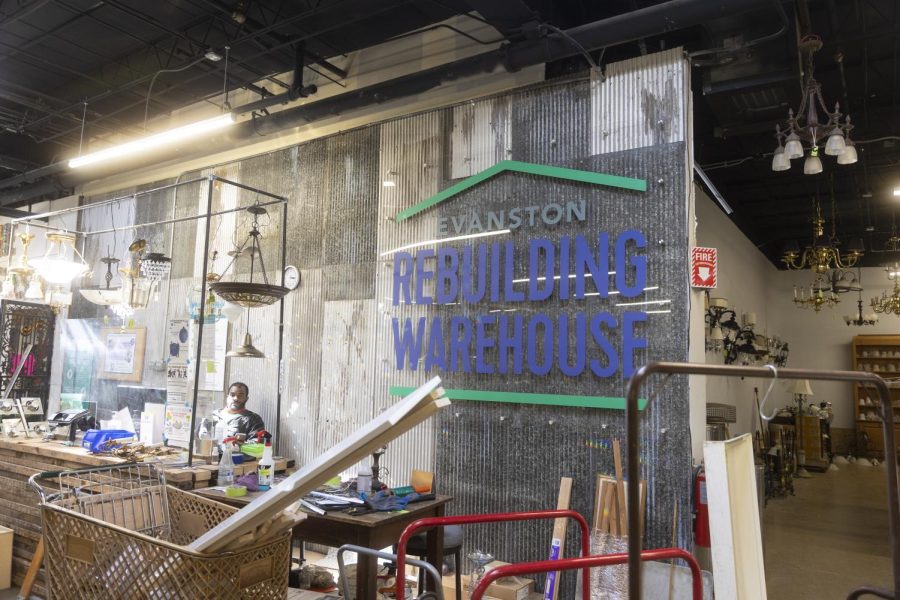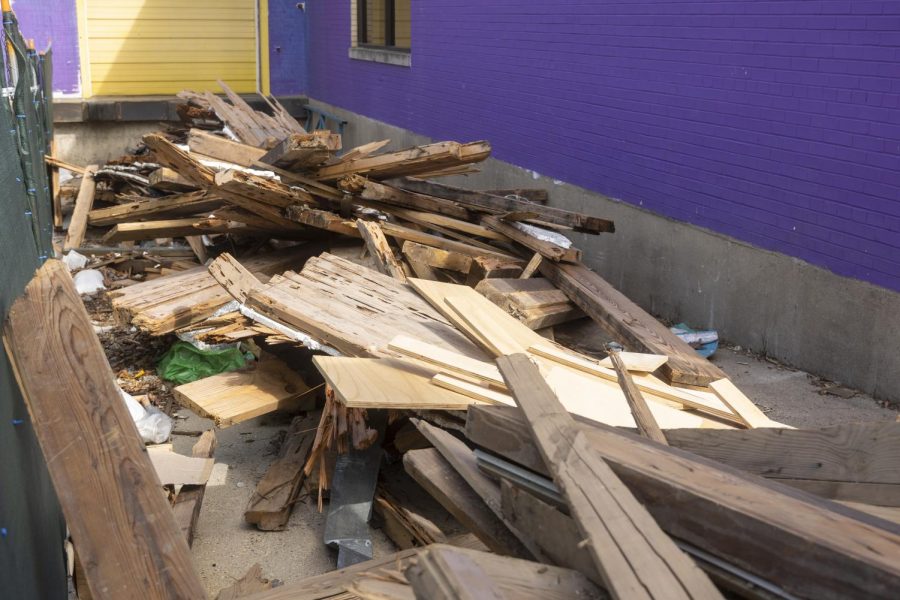Evanston Rebuilding Warehouse focuses on second chances for materials, staff
Ava Mandoli/The Daily Northwestern
Sustainability is part of the Evanston Rebuilding Warehouse’s deconstruction practices, as well as its retail location’s construction. Some of the store’s walls have been reclaimed from other buildings and are reinforced with scrap material.
April 20, 2022
At the Evanston Rebuilding Warehouse, second chances aren’t just available — they’re foundational.
Dedicated to offering new opportunities through employment and material repurposement, the nonprofit organization has offered workforce training, home deconstruction and discounted reclaimed goods for just over a decade.
“(The goal is to) bring people in and have them … think of reuse as the first option versus buying new,” Community Outreach Manager Nancy Bennett said.
Founded in 2011, the warehouse operates a retail location at 1245 Hartrey Ave. selling second-hand materials either donated or sourced from deconstruction, an alternative to demolition where materials are saved for reuse.
According to the U.S. Environmental Protection Agency, the country generated 600 million tons of construction and demolition debris in 2018, 90% of which were from demolition. Evanston Rebuilding Warehouse aims to divert construction materials from the waste stream through its deconstruction and resale efforts.
With most inventory priced at around half of market value, the warehouse offers new life to items reclaimed from deconstruction, including appliances, windows, cabinets, flooring, furniture, lighting and lumber.
Homeowners can both buy and donate to the warehouse. They can also contract staff, mainly members of the transitional employment program, for home deconstruction or smaller projects such as kitchen deconstruction. Materials donated to the warehouse from deconstruction are tax-deductible.
“(Deconstruction) is more expensive than demolition but people can…write off the value of the materials that we get,” Bennett said. “Some of these homes could be adding up to tens or hundreds of thousands of dollars of stuff.”
The materials sold in store are sourced from donations or deconstruction projects completed by members of the warehouse’s transitional employment program.
The warehouse offers two programs that aim to remove barriers to employment for participants: a pre-apprenticeship program and transitional employment program. The five-month transitional employment program is an on-site initiative that teaches participants the skills necessary to enter the construction industry. The pre-apprenticeship program lasts for six to eight weeks and prepares trainees to take entrance exams for apprenticeships in trades groups.
Director of Workforce Training and Deconstruction Anne Nicklin estimates around 40% of participants in the transitional employment program were formerly incarcerated.
“We want to make sure we get those barriers removed, make sure that we get the supportive services in place,” Nicklin said. “So that they get into a job, and they’ve got their gas figured out. They’ve got their childcare figured out. They’ve got everything ready to go because they’ve practiced it.”
The transitional employment program connects participants with local employers, which allows them to support themselves and their families. The program has a job placement rate of over 80%, Nicklin said.
However, the individuals themselves are the basis of their success, Nicklin said.
“We give them training, we connect them to employers, but we’re not creating anything that’s not there,” Nicklin said. “At the end of the day, they’re the ones who are going out there, and we don’t have any golden tickets.”
In March 2021, the warehouse merged with the Rebuilding Exchange in Chicago, which offers a similar warehouse-based workforce training program and also sells materials reclaimed from deconstruction.
Shannon Toupin said she came to the warehouse’s retail location from Fort Wayne, Indiana with her husband to find reclaimed materials for their new home. They want the house to look like it’s always been there, Toupin said, and she finds reusing is a way to stay sustainable while achieving a unique style in her home.
“There’s so many different styles you can find all in one spot,” Toupin said. “When you go to a big box store, it’s just all the same things.”
The warehouse also hosts workshops where participants can repurpose reclaimed materials into items such as cold frames for gardening from windows or vases from cypress wood. An on-going educational series of hands-on workshops aims to teach participants how to reuse materials themselves, craft things from wood and make their own repairs.
Nicklin said community-building is central to the nonprofit’s mission.
“We are here to build opportunities for the community to get connected to the materials, to get connected to the building industry and to find opportunity,” Nicklin said.
Email: [email protected]
Twitter: @ElenaHubert25
Related Stories:
— Economic Development Committee approves funding for Evanston Rebuilding Warehouse
— Evanston Made hosts month-long celebration honoring Earth Day



